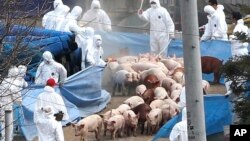South Korea has confirmed a case of foot-and-mouth disease at a hog farm, the country's first outbreak in more than three years, the agriculture ministry said in a statement on Thursday.
The case comes as Asia's fourth-largest economy strives to contain a six-month outbreak of bird flu, which has pushed pork prices to multi-year highs due to demand for alternative meat.
Testing confirmed a foot-and-mouth case at a hog farm in Uiseong county, more than 250 kilometers (155 miles) southeast of Seoul, said statements from the ministry and the Gyeonsangbuk-do provincial government.
The ministry said the disease was unlikely to be widespread as it was one of the three types that the country inoculates against. The outbreak occurred in unvaccinated hogs and some 600 pigs were being slaughtered to contain the disease.
Costs could rise
The outbreak could lead to a rise in pork and beef imports.
The pork imports are already high after South Korea's worst nationwide outbreak of foot-and-mouth in 2010-2011 led to the culling of a third of the hog population.
Many consumers have also opted for pork instead of chicken due to the bird flu outbreak, pushing up pork prices.
Three-year-high pork prices have led to forecasts of increased beef imports as consumers look for alternative meats, according to government data and industry sources.
South Korea imported nearly 170,000 tons of pork - mainly from the United States, Germany and Canada - in the first six months of this year, up 7 percent year-on-year, according to customs data.
The country's beef imports - mainly from Australia and the United States - also rose 8.5 percent to over 138,000 tons in the first half of this year from a year earlier, the data showed. Its beef and pork exports are almost none.
